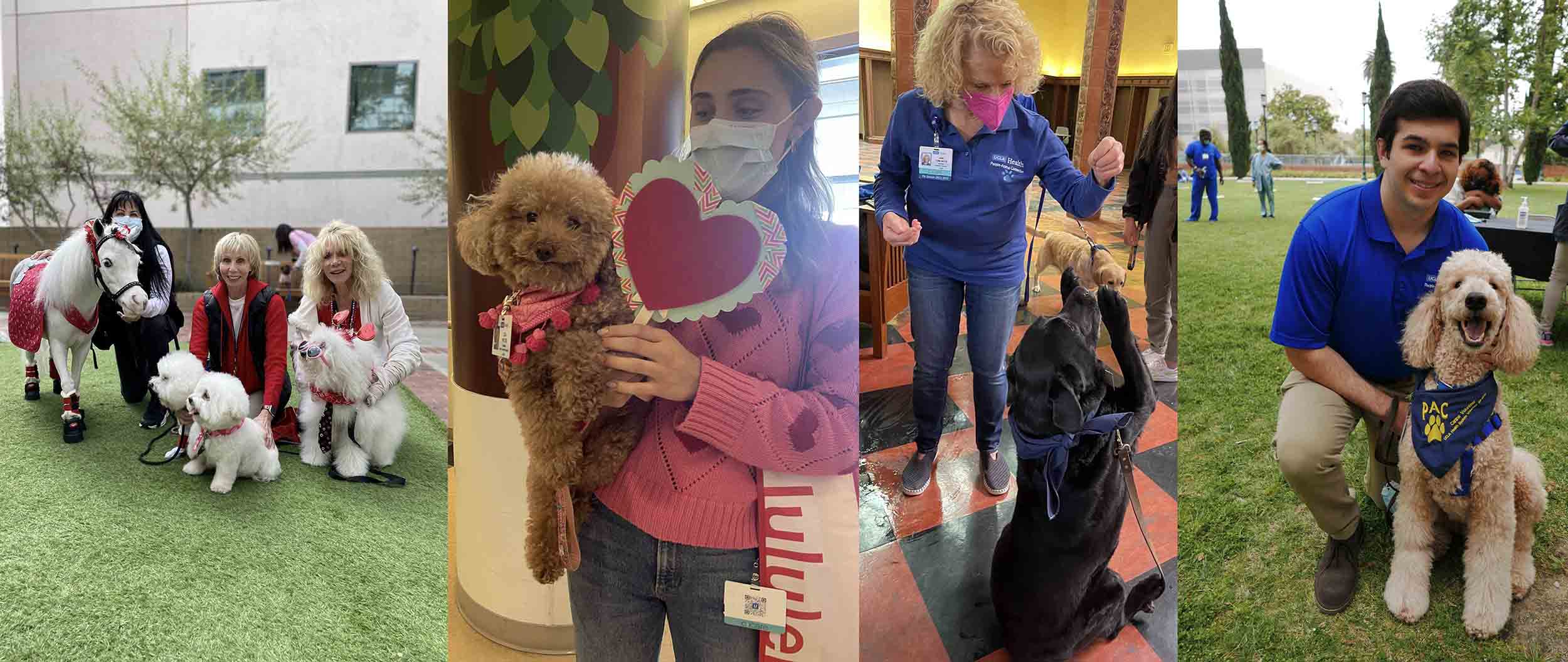The Quad: Animals help UCLA community members destress, find joy in small things

Pictured are trainers and pets part of the UCLA People-Animal Connection, an organization that coordinates pet therapy events on campus. (Courtesy of Kristin Lorico)
By Lori Bodnar
May 25, 2023 4:16 p.m.
This post was updated June 4 at 11:13 p.m.
Pets can bring a smile to people’s faces, especially after a long, stressful day of classes or any of life’s challenges.
According to the Americans with Disabilities Act, emotional support animals help individuals relieve anxiety, depression, loneliness and in some cases, phobias. In contrast, pet therapy animals work with multiple people in a clinical or academic setting to help improve physical, social, emotional and cognitive functioning.
Second-year mathematics student Colin Galbraith said he has an ESA cat named Mr. Pickles that always brightens up his day by being a constant comforting presence in his life.
“I feel like I got him because I kind of needed more consistency. … Coming home knowing that he’s just going to be in my room is very grounding,” Galbraith said. “It’s very wholesome, knowing that no matter how bad of a day I have at school or no matter what goes on, I always have my little guy I can always come back to – it’s a really nice feeling.”
Galbraith added that while he often goes on walks with his cat, the training process for emotional support animals can be difficult.
As an out-of-state student, Galbraith had to switch therapists and meet with a UC Student Health Insurance Plan therapist for 30 days before filing for a request for his emotional support animal.
“Then, I had to file it with UCLA and then wait 30-45 days and I had to get my emotional support animal,” Galbraith said. “I can’t just leave him, because he’s my cat.”
ESAs normally assist one dedicated person to provide companionship or other services, while pet therapy animals specifically visit hospitals and schools to help multiple people. The UCLA People-Animal Connection offers pet therapy to more than a thousand children and adult hospital patients per month. The team also hosts pet visit stations at Ronald Reagan UCLA Medical Center on the last Thursday of each month.
Jennifer Dobkin, manager of the People-Animal Connection, said PAC volunteers and therapy animals undergo training before visiting patients in the hospital.
“Most of our animals, that are registered, are registered through an organization called Pet Partners. So the owner will take a course through Pet Partners, and then the dog and the owner will go to an evaluation and that’s an in-person evaluation,” Dobkin said. “Then the dog is tested on various scenarios that they may encounter when visiting in a hospital or a school setting.”
According to a study of 53 adults with autism spectrum disorder, published in the Journal of Autism and Developmental Disorders, animal-assisted therapy reduced stress and anxiety.
The role of pet therapy animals can also extend beyond providing a support system for people emotionally to helping improve physical health, especially cardiovascular health.
“I think in the hospital, it provides sort of a non-judgmental distraction. It lowers anxiety. Some studies have shown that it lowers blood pressure and cortisol,” Dobkin said. “Pets, especially when visiting in a hospital setting, they provide … a comforting presence.”
Dobkin added that PAC offers many programs, including the PAC Literacy Program to motivate children to keep their reading level up while in the hospital, Tuck-in Teams to comfort patients before sleeping, and PAC at Stressbusters by UCLA libraries for students.
“We have a reading program that focuses on helping some of our pediatric patients stay actively reading while they’re in the hospital, so we offer books to our volunteer teams that they can take into the pediatric units so the kids can read to the dogs,” Dobkin said.
PAC therapy dogs also visit Powell Library during finals season.
“We go to Powell every quarter that they ask us to come, so usually around finals week. And we also do the Law Library as well,” Dobkin said.
To help relieve her stress, second-year public health student Daphne Santos visited the PAC therapy animals on campus, which bring comfort to both patients in the hospital and UCLA students, especially during finals season.
Some UCLA students find companionship in their individual emotional support animals.
“I feel like all college students need that little boost of happiness,” Santos said. “So when you get to see animals that are approachable, to me it is great.”


